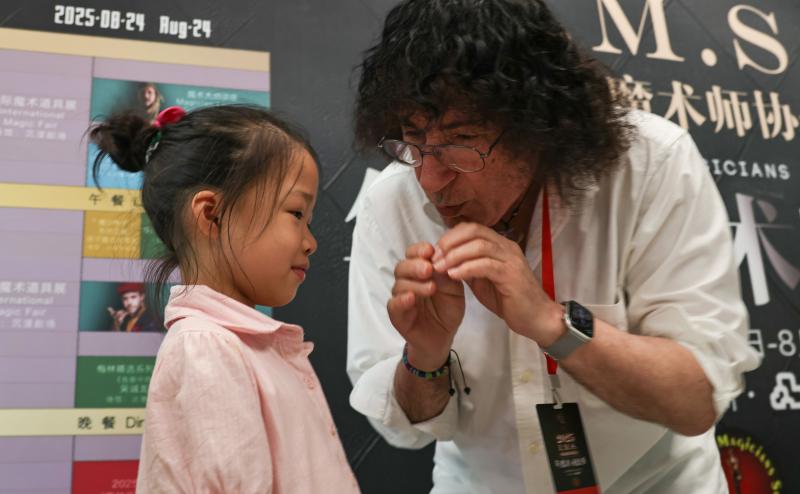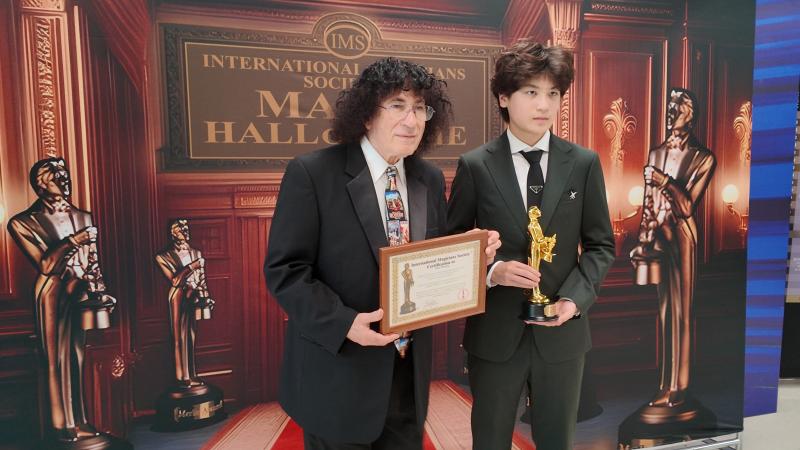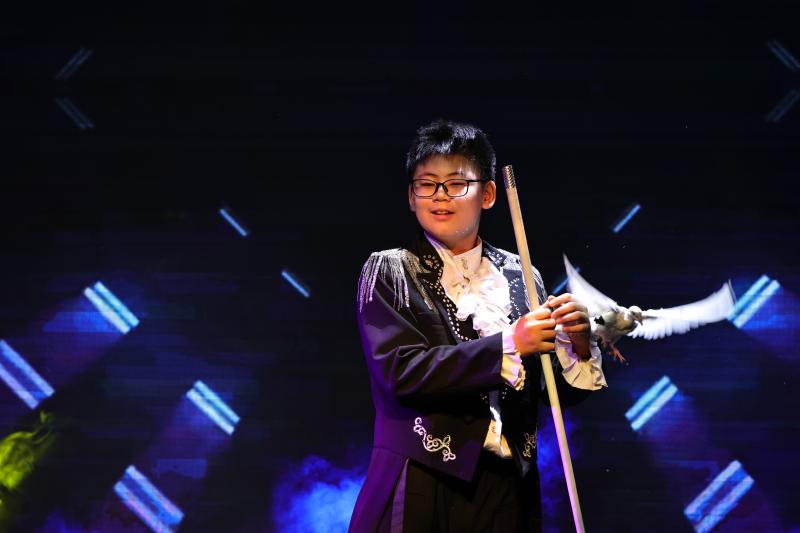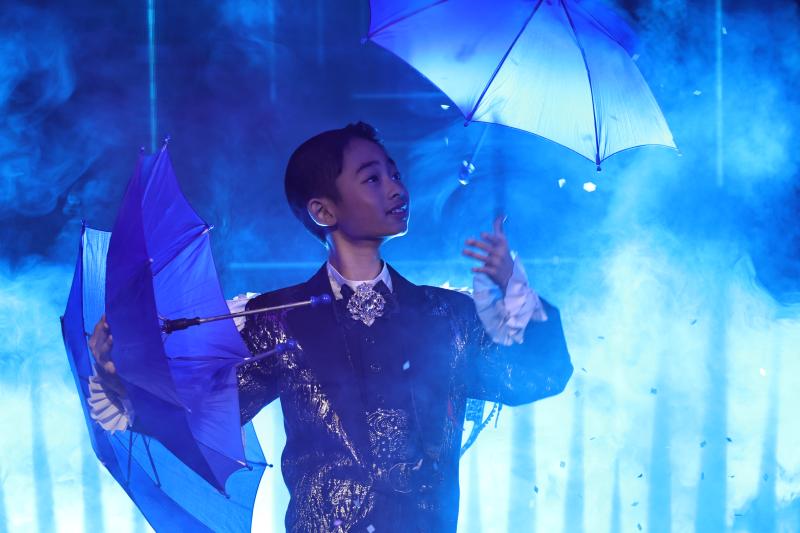Magic in the digital age: preserving and promoting a timeless art form
Writer: Wu Tong, Zach Mills | Editor: Yu Xiyao | From: Original | Updated: 2025-08-27
Video by Liu Xudong
When Tony Hassini first visited Shenzhen 35 years ago, the journey from Hong Kong was a three-hour drive through a landscape of farms and small factories. Returning last week to host the prestigious 2025 Merlin Award, the 84-year-old founder of the International Magicians Society (IMS) found the city transformed beyond recognition. “I had to take my iPhone and just videotape all these huge buildings,” he said. “It’s like they go up like mushrooms — it’s like magic.”

Tony Hassini (R), founder and chairman of the International Magicians Society, interacts with a young spectator during the International Magicians Society Merlin Award 2025 in Shenzhen on Aug. 22. Liu Xudong
These were fitting words from a man who has spent a lifetime dedicated to the art form. Widely known as the “Oscar of Magic,” the awards ceremony was held in Shenzhen over the weekend for the first time, bringing a global spotlight to the country’s burgeoning magic scene. But for Hassini, the journey was more than just professional — it was a return to a place that embodied the immense transformations he has witnessed in his own life.
A journey forged in silence
Born on the Mediterranean island of Cyprus in 1941, Hassini’s early life was marked by silence. “I have a 70% hearing loss. I can only hear 30%,” he explained. “I didn’t speak until I was 4 years old. If you cannot hear, you cannot speak.”
Fitted with large, cumbersome hearing aids, he was a shy child who could never make eye contact while speaking with others. His path led him from Cyprus to London, where he found work washing dishes in a restaurant. One day, a chance encounter changed his life.
“I got lucky. I was walking by a magic shop, and I was so amazed by what the guy was performing,” he said. “I managed to get a job there. And the first trick that I learned, when I performed it for somebody, they said, ‘How did you do that?’ It just builds your self-esteem. It makes you feel that you’re doing something that they pay attention to you.”
This discovery — that magic could be a bridge to connection — became his life’s passion. It was a passion that would eventually lead him to the United States in 1964. But upon his arrival, he found the established magic societies to be exclusive and unwelcoming, requiring sponsorship from existing members and tests for entry.
“I felt there’s got to be a magic fraternity that will accept you for your love for magic, not because somebody has to sponsor you,” Hassini said. That was the nucleus of what would become the IMS, which he founded in 1968 under a simple but powerful slogan: “To promote and preserve the art of magic.”
Building a global community
As Hassini explains, a slogan is easy to create, but difficult to deliver on. For decades, he focused on building the IMS into a truly global organization. By 1999, it had surpassed 20,000 members and was listed in the Guinness World Records as the world’s largest magic organization. Only then did he feel the society had the credibility to launch its most ambitious project: the Merlin Award.
“The idea was to present an award to magicians to elevate them, to motivate them to be better,” he explained. The award connects modern magicians to a legacy of greats — David Copperfield, Siegfried & Roy, and Criss Angel are all recipients.
In China, the Merlin Award has recognized top magicians like Lu Chen, Raymond Long, Conan Liu, and Yif. The decision to bring the ceremony to Shenzhen, however, represents a new chapter and is itself a piece of compelling theater. A global capital of artificial intelligence, robotics, and digital commerce might seem an unlikely stage for an art form rooted in analog dexterity and ancient secrets. Yet, for the magicians gathered, the city’s hyper-modernity only served to amplify the power of their craft.
Max, a professional magician from Beijing and one of the winners of last year’s Merlin Award, saw the event as a vital opportunity. “As an international award, I think it’s a really good opportunity for the Chinese public to get to know international magic,” he said. “It’s about gathering all these magic artists from around the country to see the best magic at our front door. I think it’s such a wonderful event.”
The key to this cultural exchange, according to Lian Ming, founder and chairman of Beijing Magic Woods, is connection. “We held this event with the hope of bringing the world’s magicians to China so that the world of magic can communicate,” Lian explained. “At the same time, we want these magicians from around the world to see the magic of China.”
This universal appeal is what Hassini believes makes magic a true bridge between cultures. “Magic has no boundaries. Magic doesn’t require language,” he said, before silently performing a magic trick in which he made a handkerchief vanish and reappear from his empty hands. “That is visual art, and no language is necessary.”
Preserving magic in the digital age
While the event celebrates the present, Hassini’s focus is firmly on the future. He sees magic as a timeless art form facing a modern threat. “Magic is a mystery, it’s a visual art. But we’re losing it because AI and video games are dominating,” he warned. “So we’re trying very hard to keep it alive. Because you know, once it dies, it dies.”
Part of that preservation effort involves the IMS Magic Academy, which now has over 2,000 teaching videos. “The older masters, they were teaching when I started the academy. They’re all dead, they’re all gone, but we’re preserving them,” Hassini said. “They will be teaching magic to the next generation, maybe 100 years from now.”
As the founder of Origin Magic (原点魔幻) in Beijing, the largest magic school in China with over 300 students, Tan Hao sees his role as more than just a teacher of simple tricks. In a world dominated by digital distractions, he believes magic offers children something screens cannot: a path to genuine self-confidence.
Hao has witnessed firsthand how the process of mastering even a simple trick can transform a shy, timid child. He explained that the confidence gained is not just about the performance, but about the reaction it elicits.
When a child performs a trick and hears a friend ask in amazement — “How did you do that?” — it builds a powerful sense of self-esteem. He says the real lesson is not in the secret, but in learning that with practice and skill, one can create moments of wonder for others.
“In our life, the most important thing is not only [what you] study. The skills you will use [most] are how you communicate with people and present something on stage,” Tan explained. “When you perform magic, you practice. You practice your speech, your body language, [and] your eye contact. It will make the child become better and better.”
“I hope more and more children will get interested in magic, because it can surely change their life,” Tan said.
The next generation
Of the five awards bestowed at the ceremony this year, the passionate 16-year-old high-school student Eric Zhu, recipient of this year’s Merlin “Rising Star” Award, stood out. For Zhu, the honor felt less like an endpoint and more like powerful encouragement. “It has proved my dedication,” he said, “and it also encourages me... to keep doing magic in the future.”

Tony Hassini (L) poses for a photo with Eric Zhu, who won the Most Promising Rising Star of the International Magicians Society Merlin Award 2025. Chen Siqi
That future, for Zhu, is not just about performing tricks, but about creating shared miracles. His proudest work is an ambitious piece of interactive theater called “当下时刻” (dāngxià shíkè), or “This Very Moment,” designed to be performed for a large audience. The goal, he explained, is to “create a kind of miracle with all of the people,” because the most meaningful magic involves the audience.
Contemplating life after high school and his plans for university, Zhu’s ultimate goal is to bridge what he sees as a gap between magic talent and profitability by making the art form more commercially viable while deepening its narrative power. He doesn’t just want to perform — he wants to create “storytelling magic... to convey my idea to all the audiences.”

A magician performs during the International Magicians Society Merlin Award 2025 on Aug. 24. Liu Xudong
As the Merlin Award ceremony and magic shows wrapped up, it was clear that the event was more than just a competition. It was a testament to a timeless art form finding a vibrant new home in one of the world’s most modern cities, proving that even in an age of digital wonders, the most powerful magic is still the one that happens in the hands of a master.

A young magician performs during the International Magicians Society Merlin Award 2025 on Aug. 22. Liu Xudong